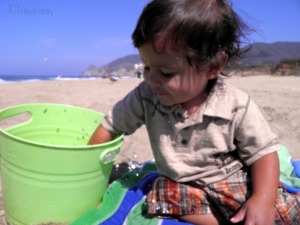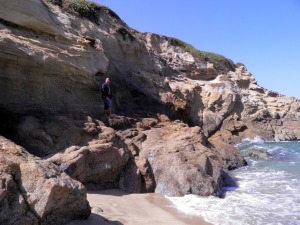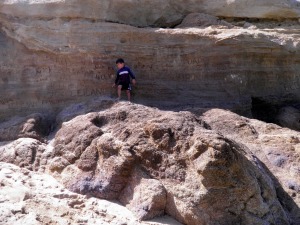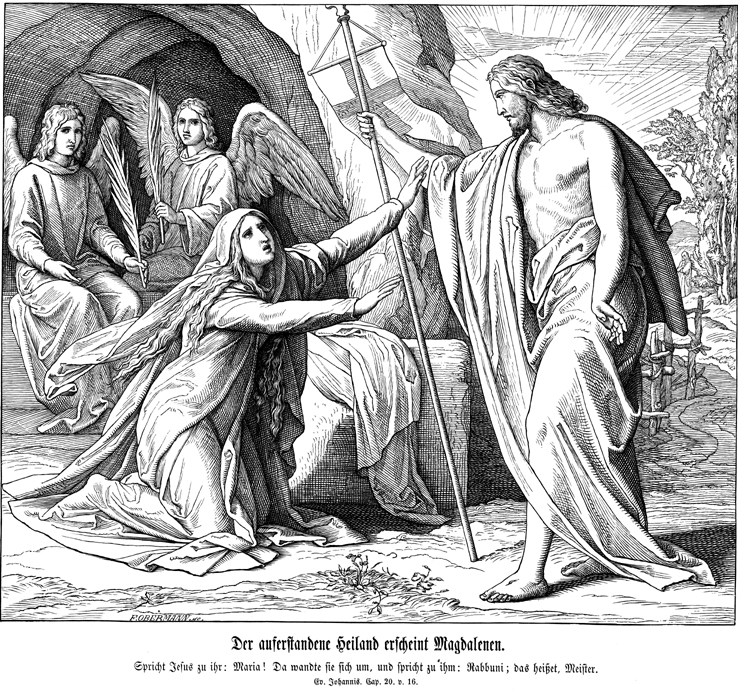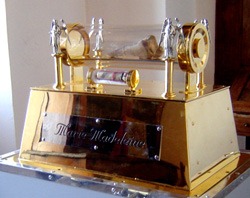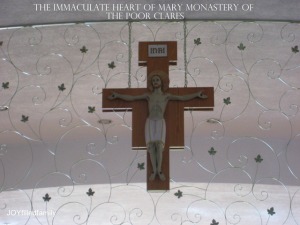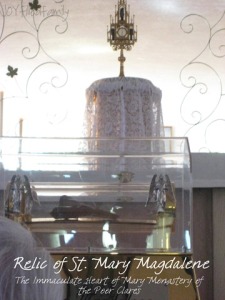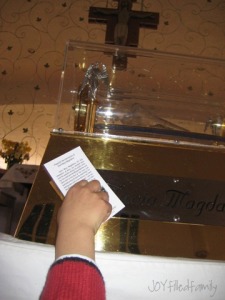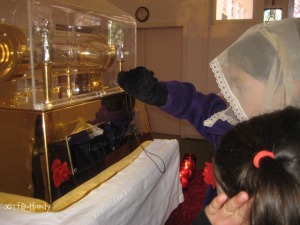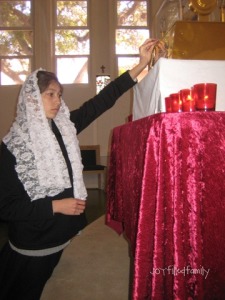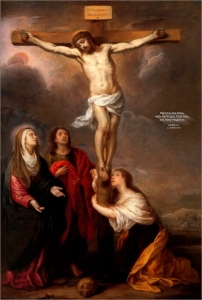Veneration ought to be shown by the faithful to the bodies of the Martyrs and other Saints, who live with Jesus Christ. For they were His living members and the temples of the Holy Ghost; He will raise them up again to eternal life and glory; and through them God grants many blessings to mankind. Therefore, those who say that the relics of the Saints are not worthy of veneration, that it is useless for the faithful to honor them, that it is vain to visit the memorials or monuments of the Saints in order to obtain their aid, are absolutely to be condemned; and, as they have already been long ago condemned [by the Second Council of Nicaea], the Church now condemns them once more” (Council of Trent, Session 25). ~ Adapted from The Liturgical Year by Abbot Gueranger
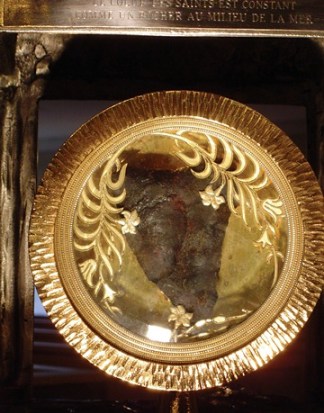 Feast of the Holy Relics
Feast of the Holy Relics
Missa ‘Multae tribulatiónes’
Red
3rd Class
The Mass of the Holy Relics is found in the Missal, among the Masses for Various Places, on the 5th of November. In some places it has been celebrated on the 3rd, in others, on the Sunday within the Octave of All Saints; but nearly always it is celebrated, most fittingly, within that Octave.
Feast of the Holy Relics
By relics of the Saints we mean all that remains of them after their death — their bones, their ashes, their clothing and other objects used by them. Enemies of the Church have condemned the cult of the relics of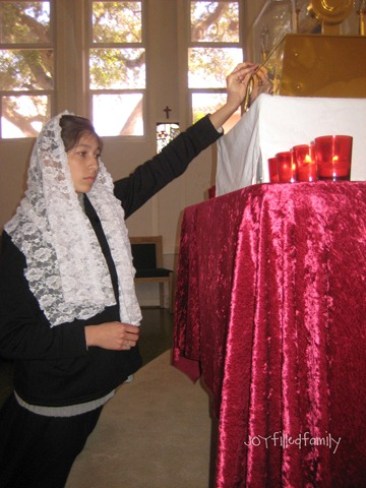 the Saints as being borrowed from pagan customs and without apostolic origin. The decision of the Council of Trent suffices to show the falsehood and bad faith of their reasoning. That Council, in effect, decreed quite otherwise, that the bodies of the martyrs and other Saints, who were the living members of Jesus Christ and the temples of the Holy Spirit, must be honored by the faithful, and that through them God grants a great many benefits to the living. Its decision was based on the usage already established in the first century and which has remained constant in the Church, as well as on the teaching of the Fathers and Councils.
the Saints as being borrowed from pagan customs and without apostolic origin. The decision of the Council of Trent suffices to show the falsehood and bad faith of their reasoning. That Council, in effect, decreed quite otherwise, that the bodies of the martyrs and other Saints, who were the living members of Jesus Christ and the temples of the Holy Spirit, must be honored by the faithful, and that through them God grants a great many benefits to the living. Its decision was based on the usage already established in the first century and which has remained constant in the Church, as well as on the teaching of the Fathers and Councils.
The cult of holy relics is therefore not only permitted, but commanded; it is not only a right, but a duty. Let us note well that the cult of holy relics diverges from pagan practices in that it is supernatural. We do not honor what remains of the Saints for any motive derived from nature, but from motives based on the Faith. If one honors the memory and remains of great men worthy of that appellation, it is regarded as justice; but when one honors the memory and remains of the Saints, it is more than justice, it is the virtue of religion. The final object of the cult of the holy relics is God who sanctifies the Saints; it is Jesus Christ, whose members the Saints are. This cult is so legitimate that God Himself sometimes glorifies the relics of His Saints by heavenly perfumes, by other marvelous privileges, by countless miracles. Let us add that the cult of holy relics also has its foundation in the glorious resurrection which is awaiting the bodies of the Saints. God Himself will reassemble these remains at the end of the world and will give them all the brilliance and beauty of which they are capable.
Let us then venerate, with respect, devotion and confidence, these precious relics which once were animated by such great souls, were the instruments of beautiful and holy works and of astonishing virtues, and which will some day be honored by a brilliant and immortal glory. Let us value pilgrimages made to the tombs of the Saints, and celebrate religiously the feast of the holy relics, which appropriately follows closely upon All Saints Day, the feast day of the splendid holy souls who are in heaven.
Vie des Saints pour tous les jours de l’année, by Abbé L. Jaud (Mame: Tours, 1950).
We do not adore, I will not say the relics of the martyrs, but either the sun or the moon or even the angels — that is to say, with the worship of “latria”…But we honor the martyrs’ relics, so that thereby we give honor to Him Whose [witness] they are: we honor the servants, that the honor shown to them may reflect on their Master… Consequently, b
y honoring the martyrs’ relics we do not fall into the error of the Gentiles, who gave the worship of “latria” to dead men.
~ St.Jerome
These [the bodies of the Saints] are made treasuries and pure habitations of God: For I will dwell in them, said God, and walk in them, and I will be their God. The divine Scripture likewise saith that the souls of the just are in God’s hand and death cannot lay hold of them. For death is rather the sleep of the saints than their death. For they travailed in this life and shall to the end, and Precious in the sight of the Lord is the death of His saints. What then, is more precious than to be in the hand of God? For God is Life and Light, and those who are in God’s hand are in life and light.
Further, that God dwelt even in their bodies in spiritual wise, the Apostle tells us, saying, Know ye not that your bodies are the temples of the Holy Spirit dwelling in you?, and The Lord is that Spirit, and If any one destroy the temple of God, him will God destroy. Surely,then, we must ascribe honour to the living temples of God, the living tabernacles of God. These while they lived stood with confidence before God.
The Master Christ made the remains of the saints to be fountains of salvation to us, pouring forth manifold blessings and abounding in oil of sweet fragrance: and let no one disbelieve this. For if water burst in the desert from the steep and solid rock at God’s will and from the jaw-bone of an ass to quench Samson’s thirst, is it incredible that fragrant oil [see below] should burst forth from the martyrs’ remains?By no means, at least to those who know the power of God and the honour which He accords His saints.
In the law every one who toucheth a dead body was considered impure,but these are not dead. For from the time when He that is Himself life and the Author of life was reckoned among the dead, we do not call those dead who have fallen asleep in the hope of the resurrection and in faith on Him. For how could a dead body work miracles? How,therefore, are demons driven off by them, diseases dispelled, sick persons made well, the blind restored to sight, lepers purified,temptations and troubles overcome, and how does every good gift from the Father of lights come down through them to those who pray with sure faith?
~ St. John of Damascus
~~~







